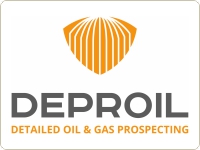The developed technology provides solutions of geological tasks at all stages of E&P activities, as well as the operation of underground gas storage assets.
EXPLORATION
Geological task: Mapping commercial hydrocarbon-
bearing pools within gas and oil bearing basins for licensing and prospecting.
|  The revolutionary algorithm The revolutionary algorithm
of 3D gravity inversion
 Objective 3D model of Objective 3D model of
rock density
 Multilayer commercial Multilayer commercial
hydrocarbon-bearing pools |
Solution method:
Mapping the location of commercial hydrocarbon-bearing pools is provided by the unique technology and in-house software package GCIS aimed at the horizon-oriented mapping of multilayer gas and oil pools. The technology is based on Joint 3D gravity data inversion with geological data and / or well data and / or seismic data. As a result, we obtain geologically consistent subsurface models of density with a lateral and vertical resolution of 100 m and up to 1 m correspondingly.
Solution examples:
An Integral 3D Geo-Modeling Helps to Reveal New Exploration Trends - Case Study for the NW Black Sea Basin, Ukraine.
PROSPECTING
| Geological task: Mapping commercial hydrocarbon-bearing pools within licenses and its ranking by the volume of total and recoverable reserves and initial production rate in new wells. |  Depth and contour of Depth and contour of
commercial pools
 Shape and origin of Shape and origin of
commercial pools
 Total and recoverable Total and recoverable
hydrocarbon reserves P90
|
Solution method:
Ranking commercial hydrocarbon-bearing pools by their prospecting priority and defining the order of new wells drilling is performed with considering estimated volumes of total and recoverable hydrocarbon reserves and initial production rates for new wells. Estimation of these parameters is based on the suggested by DEPROIL LTD 3D model of hydrocarbon reserves density, which contains information about the amount of hydrocarbons per reservoir rock volume unit. In other words, it shows commercial hydrocarbon reserves within the pool and free of any geological and petrophysical factors.
Solution examples:
Fold-Thrust Belt Exploration: How to reduce risks when your seismic data are absent or pure? Case study for Krosno nappe in Carpathian fold-thrust belt.
PRODUCTION
| Geological task: Mapping production-induced changes within gas pools: pressure drop, gas saturation change, gas-water contact rise, identification of the unswept zones. |  3D model of porosity and 3D model of porosity and
hydrocarbon saturation
 3D model of hydrocarbon 3D model of hydrocarbon
reserves density
 3D model of initial production 3D model of initial production
rate in new wells |
Solution method:
Choosing optimal location for drilling new commercial wells is carried out by creating 3D petrophysical models and 3D model of hydrocarbon reserves density, which reflect an internal heterogeneity of reservoir rocks properties within inter-well space. It is achieved by joint active inversion of gravimetric, well and seismic data.
Solution examples:
Mapping pressure drop and flooding areas based on the results of time-lapse gravimetric observations and borehole gravimetry (4D+1D)
MONITORING
| Geological task: Mapping pool changes within the gas field or underground gas storage under while its operation: change of pressure, gas saturation, location of dynamic gas pools, working gas pathways. |  4D gravimetric 4D gravimetric
observations
 3D model of pressure, 3D model of pressure,
temperature, porosity
and gas saturation
 Quantitative estimation of Quantitative estimation of
changes within the pool
|
Solution method:
Control over production-induced changes within producing commercial gas pools or underground gas storages is carried out basing on 3D models of pressure, temperature, porosity and gas saturation resulted from joint 4D + 1D inversion of gravimetric and well logging data. Created models are being permanently updated by time-lapse high-precision gravity survey and calibrated by density model, hydrodynamic and production data.
Solution examples:
Optimization of underground gas storages exploitation as result of time-lapse gravity measurements and 4D interpretation - case study of Dashava UGS
Control over the operation and optimization of gas storage by the results of high-precision gravimetric observations


 The revolutionary algorithm
The revolutionary algorithm